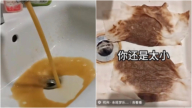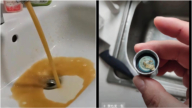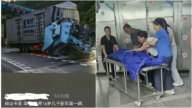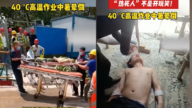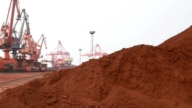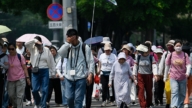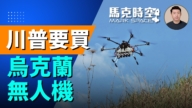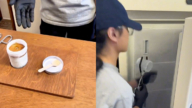【新唐人2013年01月08日讯】官员财产公开作为一种预防和遏制腐败的手段,在很多国家已成为一项制度化的措施。而在中国大陆,官员财产公开仍旧是“只闻楼梯响,不见人下来”。虽然广东、江苏等地的试点工作引起极大关注,但一项调查显示,超过9成的受访者表示不信任官员财产公开。
中共总书记习近平及新领导班子上任伊始,即高唱“反贪腐”、“改作风”,并采取了一些新措施﹔而中纪委书记王岐山在去年11月也喊出要“把反腐斗争引向深入”的口号。这让被视为“反腐利器”的官员财产公示问题近来备受关注。
官员财产公开至今已在大陆27个市县推行过试点,珠海横琴新区、广州南沙新区、韶关始兴县成为3个“新成员”。
不过,据《中国青年报》1月7号报导,一项有5604人参与的网路在线调查显示,90.81%网民对官员财产公示持不信任态度,理由是“灰色收入和转移性财产谁会公示﹖”
而在各试点地方,“什么财产需要公示”标准不一。例如在重庆江北区,“拟提拔官员”的家庭成员及收入财产等情况不会公示,只作为“组织上掌握”。
北京时政观察人士华颇表示,很多官员或他们妻儿的名下即使没有什么财产,也能通过其他方式,如秘密账户等转移财产。
北京时政观察人士华颇:“七常委公布的财产,前阵子网路流传公布的财产,只是他们夫妻两人的财产,并没有说他们孩子有多少财产。官员财产公开得扭扭捏捏,犹豫不定,再加上不彻底性,所以引起了广大网友的不信任。”
对此,网友(“迷失水晶猫”)留言说:“居然还有一成人天真的相信,贪官们 更不相信。”还有网友(“乐活潜水员”)则讥笑说:“那剩下的1成人就是官员本人和家属了 。”
法学和中国问题研究专家赵远明指出,由于中共一直是靠谎言、欺骗来维持它的独裁统治,这种长期以来在人们心中留下的印象,也造成民众难以相信。
法学和中国问题研究专家赵远明:“腐败搞女人、淫乱,维持不正当性关系的,都不是一位数字,大部分都是两位数字,甚至还有上三位数字的。而且有些很小的官,贪污的数字却是非常大的,上亿。那么在老百姓心目当中,曝光的这些干部都贪这么多,现在一到公开官员财产的时候,突然这个数字就小很多,是不成比例的。”
报导说,在试点的27个市、县中,江苏淮安、重庆江北区和黔江区正在探索阻力最小的路子,那就是在所谓“拟提拔官员”中率先推行财产公示。
法学和中国问题研究专家 赵远明:“新提拔的官员,他可能相对来讲比较清廉。当他位置比较低时,一,他没有这种能力;不公平,新任官员估计也难以接受。
北京时政观察人士华颇:“因为反差实在太大了。他们的前任都赚得脑满肠肥,到他们就只剩下清汤寡水,他们心里是过不去的。而且他们的前任积累的财产都是民脂民膏,怎么能说让他们就逍遥法外,平安下庄呢?这是很不合理的事情。民众也不会答应。”
官员财产公示制度在全球近100个国家和地区实行,自1987年首次在中国提出后,走过了25年的“酝酿期”,如今,二十多年过去了,官员财产仍然难以落实。
法学和中国问题研究专家赵远明:“真正的公布财产,还要有群众的监督。否则的话,公布财产肯定是走过场。肯定是糊弄老百姓。关键是制度的改革,要有监督的程序。”
对于中共所谓的财产公开,华颇不抱乐观态度。他说,到底公开到什么程度,还有待观察。但在维持目前独裁体制的前提下,很有可能会做出“一锅‘夹生饭’。”
采访/李韵 编辑/王子琦 后制/陈建铭
Over 90% Distrust CCP Officials’ Publicized Assets
In many countries, publicizing the officials’ assets has
become an institutionalized measure in preventing corruption.
In Mainland China, the measure is in a state of ‘all talk
and no action’ or as locals put it, “only thunder, but no rain”.
Pilot programs in Guangdong, Jiangsu and other provinces
have brought great concern—as a survey shows,
more than 90% of people say, they do not trust the
legitimacy of the officials’ property publications.
The Chinese Communist Party (CCP)’s,
new leader Xi Jinping promoted anti-corruption and
a ‘change in style’ right after taking power,
introducing some new measures.
Secretary of Central Commission for Discipline Inspection,
Wang Qishan, also raised a “deeper fight against corruption”
last November; triggering the publication of official assets as
an anti-corruption tool—it’s an issue of public concern lately.
Pilot programs for publicizing the officials’ properties are
being implemented in 27 cities and counties in the mainland.
The Hengqin New District, Guangzhou Nansha New District,
and Shaoguan Shixing County are 3 new areas adopting it.
China Youth Daily published an online survey on January 7
saying, over 90% of the 5,604 people surveyed do not trust the publicized property reports,
due to typical ‘gray income’
and ease in the transfer of property.
In each of the areas, different standards have been used
regarding what type of property needs to be publicized.
For example, in Jiangbei District of Chongqing, family
members and promoted officials are not required to
publicize their property—the information is made known
to the CCP and kept officially.
Current Affairs Observer in Beijing said that many officials
had hidden their properties, they transfer their properties by all secret means.
[Hua Po,]: “In China, many officials or their wives and
children have no property under their names,
since property can be transferred through other means,
like a secret account.
The seven Standing Committee members
did announce their property recently,
but it was limited to husband and wife,
and their children weren’t included.
The officials’ great reluctance to participate, along with
the program’s lack of thoroughness has caused distrust from the majority of people.”
Netizen (“Lost Crystal Cat") said, “In actuality,
some people are even naïve enough to believe the reports;
corrupt officials, of course, do not believe them.”
Netizen (“Happy Divers") said, “What about the other 10%?
—must be the officials themselves and their families."
Lawyer and China expert, Zhao Yuanming, points out that,
the CCP has always relied on lies and deception to maintain
its dictatorship; this long-term image causes public distrust.
[Zhao Yuanming]: “You name it—corruption;
womanizing; sexual misconduct;
maintaining mistresses in the double or even triple digits—
it’s all ripe in the history of the CCP.
Some low ranking officials have pocketed a ton of money,
even as much as hundreds-of-millions.
The public remember that those officials who were exposed
had accumulated such great wealth.
But when the officials publicize their assets, the figures
have shrunk drastically—it’s not proportionate at all.”
Among the 27 pilot cities and counties, Huai’an, Jiangsu,
Chongqing’s Qianjiang District and Jiangbei District are
reported to have experienced the least amount of resistance
in implementing the publication program.
Yet it’s worth noting—the program has been applied firstly
to the newly promoted officials or those awaiting promotion.
[Zhao Yuanming]: “Newly promoted officials may be relatively
straight; because of their low rank they lack the skill and greed.”
Yet, Hua po says, the new officials’ disclosures
are also hard to believe.
[Hua Po]: “It’s hard to accept,
because the contrast is too great;
their predecessors acquired so much and
now these officials say they have hardly anything.
After all, it’s the public’s hard earned money
they’re taking—how can they escape punishment?
The whole thing is very unreasonable
and the public do not agree with it either.”
Nearly 100 countries and regions worldwide are applying
this public disclosure of official property, and it was first introduced in China in 1987.
After a gestation period of 25 years,
it’s now still proving difficult to implement.
[Zhao Yuanming]: “To really publicize assets needs mass
public supervision;
otherwise, it’s only about going through the motions
and is based on fooling the public.
The key issue of system reform is on having a public
supervision procedure."
Hua Po says he is not optimistic about the
CCP’s disclosure of official assets.
He said that how much they will disclose
remains to be seen,
but under the premise of maintaining the CCP’s dictatorship,
it’s likely the program will be ran half-heartedly
—it’s like making a pot of half-cooked rice.





